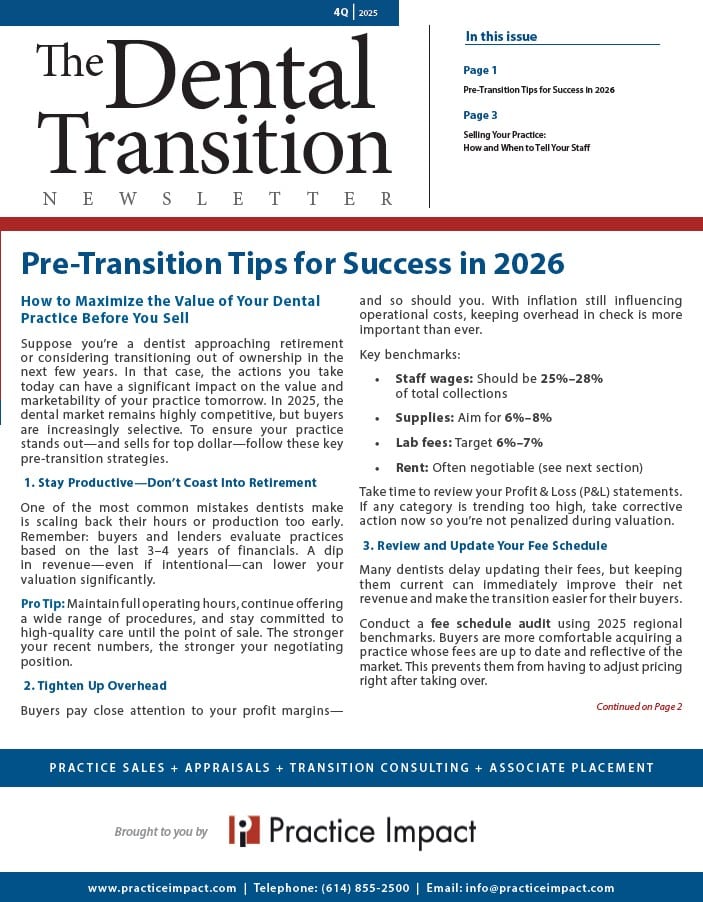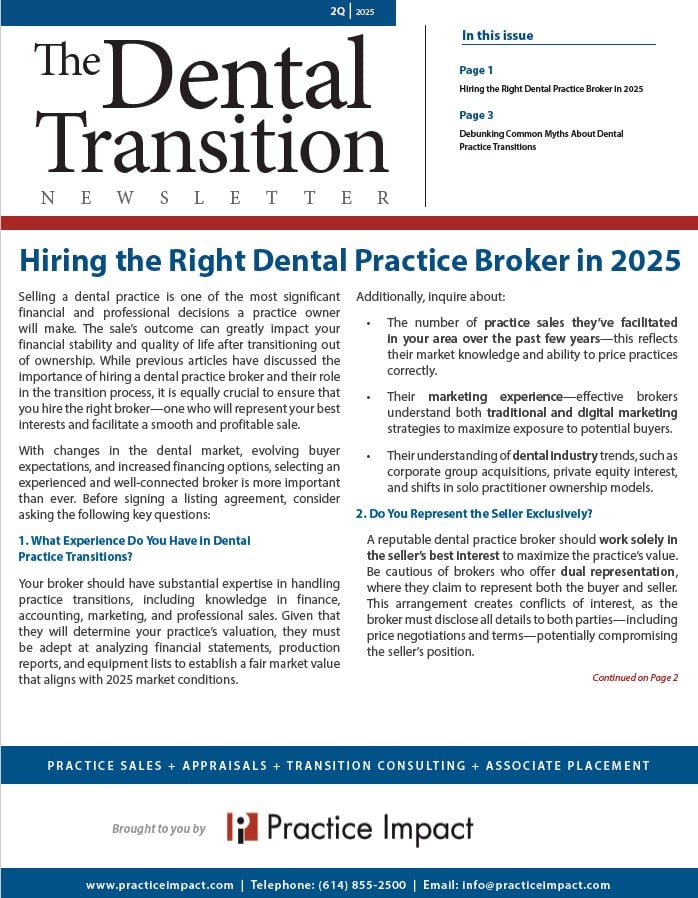Buyer Financing ~ What Do Banks Look for in a Practice Acquisition Loan?
Buying a dental practice is one of the biggest investments you will make and borrowing that much money can be a daunting task. You may think that you won’t qualify for a loan, especially in the current economic environment, but banks are still lending to dentists. You just need to be smart about your finances and carefully select the right practice to purchase. Most banks will work with dentists on obtaining a loan for a practice acquisition, but not every bank truly understands the business of dentistry and what makes a strong sale. Practice Impact typically works with a group of banks which have a medical/dental division and have bankers and underwriters devoted to these types of deals who truly understand the business aspect of dentistry. When Practice Impact is assisting a buyer to obtain financing, we put together a bank finance package with information about both the buyer and the practice being purchased and send it the banks we feel will offer the best loan package for the buyer. We are always open to sending it to the buyer’s current banking institution or any bank the buyer wishes, but find that the best scenario for the buyer usually ends up being from the banks we deal with on a regular basis. Whichever banks you choose to obtain offers from, they will all want to make sure that you and the practice are a good match and that the deal is a strong one with as little risk as possible. In order to do this, banks will require a significant amount of information regarding your financial strength and the qualities of the practice.
In regards to the practice, the bank wants to ensure several things, including the following:
- The practice cash flows properly with the buying doctor. There needs to be enough revenue coming in to cover all of the practice’s expenses, including a reasonable salary for the doctor and some reserve funds for unforeseen costs.
- The purchase price is consistent with the value of the practice. If the purchase price is too high, it will be difficult for the buyer doctor to produce enough revenue to cover all of the expenses and the loan payment each month. Being underwater could hurt the doctor’s chances of getting equipment financing, selling the practice before the loan is paid off (because you will not recoup the money you need to pay off the original loan), or getting a line of credit for unforeseen costs or to temporarily assist your cash flow.
- The Practice will have a home for the initial loan term. Banks want to ensure that the buyer is purchasing the real estate or has a lease/lease assignment that covers the initial loan term (including options for extensions to cover the loan term). The bank does not want to lend money for a practice that only has a one or two year lease and could be forced to move because a landlord decides not to renew a lease.
- The practice is debt free and clear of all liens. The bank will want the first position on the practice liens when the buyer takes over. This secures the loan for the bank in the rare case of a default. Often times, selling doctors still have some sort of loan on the practice (for equipment, a line of credit, acquisition loan, etc.) when they sell it. Any loans tied to the practice will need to be paid off at or before the closing so that the bank can take the first position on the buyer’s practice loan.
- Practice details. Where is the practice located? How much competition is nearby? How many active patients are in the practice? How many operatories are there? What kind of procedures is being performed by the selling doctor? The bank will need to see what kind of practice the buyer is purchasing and can obtain all of this information from the practice information booklet that Practice Impact provides for each listing.
Banks will also look into the buyer’s personal financial situation, especially in regards to the following:
- Your credit report. Do you have a decent credit score? Are there any late pays, delinquent accounts or charge-offs on your credit history? Your credit doesn’t have to be perfect, but it must be decent. Before considering a practice purchase you should be aware of your credit score and what is on your credit report so there are no surprises.
- Your personal balance sheet. How much do you have in assets and liabilities? Banks want to make sure that you don’t have too much debt and can financially handle adding a practice loan to that debt. They will look specifically at your debt to equity ratio. Many younger doctors worry about their student loan debt when applying for a loan. Banks understand that most dentists will have a significant amount of student loan debt and also that those debts have been rising in the last few years. Their concern with student debt is that you did not incur more debt than truly necessary, that you didn’t live above your means and rack up a lot of debt while in school. We have also had a few cases in the last few years of dentists helping a family member purchase a car, house or other large purchase by signing for a loan. Even though you are not paying this loan each month, if it’s in your name, then it must be included on your balance sheet. You are legally responsible for it and it will be a factor in your debt to equity ratio! Remember, if you can’t comfortably afford the loan payments yourself then don’t co-sign or put your name on a family member’s loan!
- Your monthly budget. What are your typical expenses? Can you make enough money with this practice to cover all of your personal expenses?
- Background information. If a bank is giving your several hundred thousands of dollars they will obviously want to know a little about you where did you go to dental school? Have you owned a practice before? How long have you been an associate and where have you worked?
- Insurance. What insurances do you have now? Do you have enough disability and life insurance to maintain the practice and cover your practice loan in the event that something happens to you or the office? Banks will all require insurance to cover the practice assets in case something happens to the office (i.e. fire). Depending on the amount of your loan and bank you choose, you may also be required to have life and disability insurance and possibly even assign the policy to the bank during the life of the loan.
These are just some of the details banks will look at when your loan is going through underwriting. Although this is not everything, it is a good overview and helps you understand what to watch and what you need to understand about your credit and what you should understand about the practice you are purchasing before you pursue a practice purchase. It also explains why PI asks for so much information when we prepare finance packages! If you have any questions about the financing process give Practice Impact a call. We are happy to answer your questions or refer you to an excellent banker.





